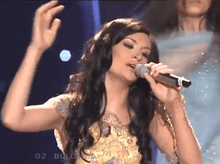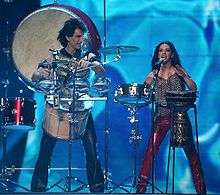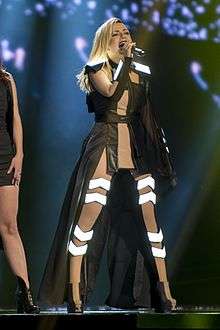Bulgaria in the Eurovision Song Contest
| Bulgaria | |
|---|---|
| Member station | Bulgarian National Television (BNT) |
| National selection events |
National Final
Internal Selection
|
| Appearances | |
| Appearances | 10 (2 finals) |
| First appearance | 2005 |
| Best result | 4th: 2016 |
| Worst result | 19th SF: 2005 |
| External links | |
| BNT page | |
| Bulgaria's page at Eurovision.tv | |
|
Bulgaria in the Eurovision Song Contest 2016 | |
Bulgaria has participated in the Eurovision Song Contest 10 times since making its debut at the 2005 contest in Kiev. The country's best result is a fourth-place finish for Poli Genova at the 2016 contest.
Bulgaria has failed to qualify for the final in eight out of ten appearances at the contest, most narrowly in 2012, when Sofi Marinova lost out on the 10th qualifying place from the second semi-final in a tie-break with Norway. Prior to 2016, Bulgaria's only entry to reach the final was Elitsa & Stoyan, who finished fifth in 2007.
History
Bulgaria first competed at the Eurovision Song Contest in 2005, represented by the jazz-inspired band Kaffe with their song "Lorraine". Receiving only 49 points, they placed 19th in the semi-final and failed to qualify to the final. They were succeeded by Mariana Popova with "Let Me Cry", however she also failed to qualify for the final, coming 17th with 36 points in the semi-final.
Bulgaria's first qualification for the final came in 2007 when Elitsa Todorova & Stoyan Yankoulov performed the song "Water" (Bulgarian: Voda/Вода). This was the first Bulgarian language song to compete in the contest, placing 6th in the semi-final with 146 points. Todorova and Yankulov repeated their song in the final and received 157 points, placing 5th in a field of 24.
In previous years, if a country placed in the top 10 countries in the final they automatically qualified to the final of the next contest. Had this rule remained for the 2008 contest, Bulgaria would have directly qualified for the final. However, a change in rules due to the large intake of countries participating in the contest meant that only five countries, the host country and the Big 4 countries, would automatically qualify to the final. As such, Bulgaria were forced to compete in one of the two semi-finals of the 2008 contest in Serbia.
At the 2008 contest, Bulgaria were represented by Deep Zone & Balthazar with the song "DJ, Take Me Away". They, however, could not repeat Todorova and Yankulov's result and received only 56 points, placing 11th of 19 competing.
Bulgaria competed in the 2009 contest in Russia. Bulgaria was the first country to begin their selection for the fifth Bulgarian entry to Eurovision, with 'Be A Star', the national final, beginning in October 2008. The winner was Krassimir Avramov with his "Popera" song Illusion. It failed to qualify for the final in Moscow coming 16th out of 18 participants in the first semifinal.
In October 2009, BNT announced that Miroslav Kostadinov would represent Bulgaria at the Eurovision Song Contest 2010 in Oslo, Norway. He sang the song "Angel si ti" (Ангел си ти). It was the first song since 2007 to be sung in Bulgarian.[1][2][3][4] However, for the third consecutive year, Bulgaria's entry failed to qualify for the final, coming 15th out of 17 participants in the semifinal.
In 2011, Bulgaria was represented by Poli Genova, and the country's entry was sung in Bulgarian for the third consecutive year. Her song was called "Na Inat", translated as "For Spite", and missed out on a place for the final after coming 12th in the second semi-final, making 2011 the fourth year in a row that Bulgaria didn't reach the final. In that year she competed with 18 more singers in the final of "EuroBGvision" (where by means of SMS voting the TV audience selects who will represent Bulgaria in the Eurovision Song Contest). This was her fourth time in which she took part in the "EuroBGvision" and her first win.
The singer Sofi Marinova represented Bulgaria in the 2012 Eurovision contest in Baku with a song called Love Unlimited (Bulgarian: Lubov bez granitsi/Любов без граници). Her song was mainly in Bulgarian but it also contains the phrase 'I Love You' in 12 other languages including Turkish, Greek, Spanish, French and Serbian and others. Bulgaria's entry tied with Norway for 10th place in its semifinal; however, the tie broke in favor of Norway because it received points from more countries, making 2012 the fifth year in a row that Bulgaria didn't proceed and sing in the final.
In 2013, Elitsa Todorova and Stoyan Yankoulov were chosen through an internal selection to represent Bulgaria for a second time, this time in Malmö. Their song, Samo shampioni (Bulgarian: Само Шампиони), placed sixth in the second semifinal's televoting results, but 17th place (last) in the jury's results. The duo placed twelfth, with 45 points, thereby excluding Bulgaria from the final yet again.
Withdrawal
On 22 November 2013, Bulgaria announced that they would not be participating in the Eurovision Song Contest 2014 due to financial problems.[5]
On 15 September 2014, it was announced that Bulgaria had submitted a preliminary application to compete in the Eurovision Song Contest 2015,[6] but one month later it was announced that they would not be returning to the contest.[7] On 31 October 2014, it was announced that Bulgaria's participation was still undecided due to the political situation of the country. The EBU granted an extension and awaited a final decision.[8] On 18 December 2014, BNT confirmed via their official Eurovision Twitter account that they would not take part in the 2015 Contest.[9]
Return
On 15 September 2015, it was announced that BNT sent a preliminary application in order to compete in the 2016 contest,[10] and the effective participation was further confirmed on 26 November 2015,[11] thus marking the return of the country. Poli Genova represented Bulgaria for the second time (the first time being in 2011) and by placing fourth, became the highest-placing Bulgarian entry in the contest's history.
Contestants
- Table key
| Year | Artist | Language | Title | Final | Points | Semi | Points |
|---|---|---|---|---|---|---|---|
| 2005 | Kaffe | English | "Lorraine" | Failed to qualify | 19 | 49 | |
| 2006 | Mariana Popova | English | "Let Me Cry" | 17 | 36 | ||
| 2007 | Elitsa & Stoyan | Bulgarian | "Water" | 5 | 157 | 6 | 146 |
| 2008 | Deep Zone & Balthazar | English | "DJ, Take Me Away" | Failed to qualify | 11 | 56 | |
| 2009 | Krassimir Avramov | English | "Illusion" | 16 | 7 | ||
| 2010 | Miro | Bulgarian, English | "Angel si ti" (Ангел си ти) | 15 | 19 | ||
| 2011 | Poli Genova | Bulgarian | "Na inat" (На инат) | 12 | 48 | ||
| 2012 | Sofi Marinova | Bulgarian1 | "Love Unlimited" | 11 | 45 | ||
| 2013 | Elitsa & Stoyan | Bulgarian | "Samo shampioni" (Само шампиони) | 12 | 45 | ||
| Did not participate between 2014 and 2015 | |||||||
| 2016 | Poli Genova | English, Bulgarian | "If Love Was a Crime" | 4 | 307 | 5 | 220 |
| 2017 | |||||||
- 1.^ The song also contains phrases in Arabic, Azerbaijani, English, French, Greek, Italian, Romani, Serbo-Croatian, Spanish and Turkish.[12]
Voting history
As of 2016, Bulgaria's voting history is as follows:
|
|
|||||||||||||||||||||||||||||||||||||||||||||||||||||||||||||||||||||||||||||||||||||
Commentators and spokespersons
| Year(s) | Commentator | Spokesperson |
|---|---|---|
| 2005 | Elena Rosberg and Georgi Kushvaliev | Evgenia Atanasova |
| 2006 | Dragomir Simeonov | |
| 2007 | Mira Dobreva | |
| 2008 | Valentina Voykova | |
| 2009 | Yoanna Dragneva | |
| 2010 | Desislava Dobreva | |
| 2011 | Maria Ilieva | |
| 2012 | Anna Angelova | |
| 2013 | Yoanna Dragneva | |
| 2014 | No broadcast | Bulgaria did not participate |
| 2015 | Elena Rosberg and Georgi Kushvaliev | |
| 2016 | Anna Angelova | |
| 2017 | TBA | TBA |
NOTE: In 2015, BNT screened only the grand final. The semi-finals were not screened.
Photogallery
-

Mariana Popova at Athens (2006)
-

Elitsa Todorova and Stoyan Yankoulov at Helsinki (2007)
-
.jpg)
Elitsa & Stoyan at Malmö (2013)
-

Poli Genova at Stockholm (2016)
References
- ↑ Floras, Stella (18 October 2009). "Bulgaria: Miro selected for Eurovision 2010". ESCToday. Retrieved 18 October 2009.
- ↑ Siim, Jarmo (2009-10-18). "Miro to represent Bulgaria". European Broadcasting Union. Retrieved 2009-10-18.
- ↑ Dahlander, Gustav (2010-02-28). "Miro flying to Eurovision on angelic wings". European Broadcasting Union. Retrieved 28 February 2010.
- ↑ Hondal, Víctor (28 February 2010). "Miro will sing Angel si ti in Oslo". ESCToday. Retrieved 28 February 2010.
- ↑ Jiandani, Sanjay (22 November 2013). "Bulgaria: BNT will not participate in Copenhagen". ESCToday. Retrieved 22 November 2013.
- ↑ Jiandani, Sanjay (20 September 2014). "Bulgaria: BNT confirms preliminary participation in Eurovision 2015". esctoday.com. ESCToday. Retrieved 20 September 2014.
- ↑ Jiandani, Sanjay (10 October 2014). "Bulgaria: BNT will not participate in Eurovision 2015". esctoday.com. ESCToday. Retrieved 10 October 2014.
- ↑ Jiandani, Sanjay (31 October 2014). "Bulgaria: No final decision on Eurovision 2015 yet". esctoday.com. ESCToday. Retrieved 31 October 2014.
- ↑ Jiandani, Sanjay (19 December 2014). "Bulgaria: BNT will not participate in Eurovision 2015". esctoday.com. Retrieved 19 December 2014.
- ↑ Jiandani, Sanjay (15 September 2015). "Bulgaria: BNT confirms participation in Eurovision 2016". esctoday.com. Retrieved 15 September 2015.
- ↑ "Bulgaria returns to Eurovision Song Contest". eurovision.bnt.bg. Bulgarian National Television. 26 November 2015. Retrieved 26 November 2015.
- ↑ "Lyrics of "Love unlimited"". European Broadcasting Union. Retrieved 15 July 2012.
External links
- Points to and from Bulgaria eurovisioncovers.co.uk

